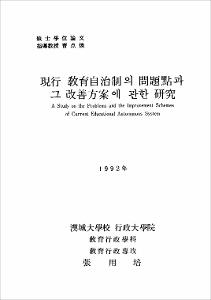現代 敎育自治制의 問題點과 그 改善方案에 관한 硏究
= (A) study on the problems and the improvement schemes of current educational autonomous system
- Type
- Thesis
- Department
- 교육행정학과교육행정전공
- Issued Date
- 1992
- Publisher
- 한성대학교 행정대학원
- Keyword
- 교육자치제; 지방자치; educational autonomous system
- Files in This Item:
-
-
Download
 000000065859.pdf
기타 데이터 / 2.44 MB / Adobe PDF
000000065859.pdf
기타 데이터 / 2.44 MB / Adobe PDF
-
Items in Repository are protected by copyright, with all rights reserved, unless otherwise indicated.